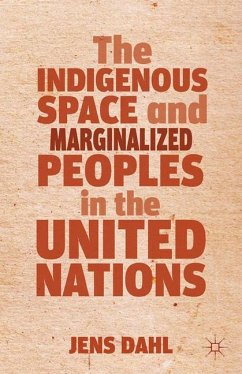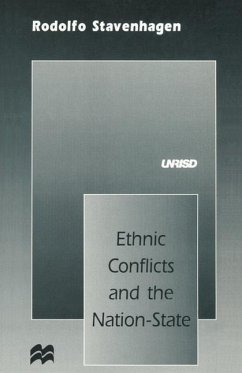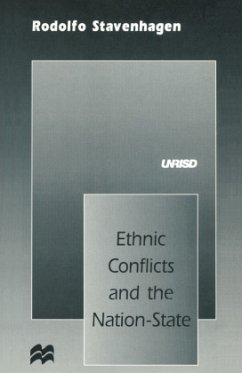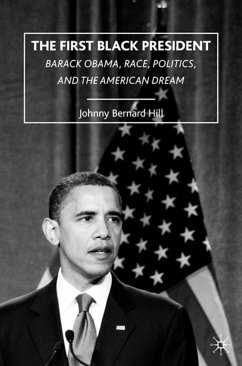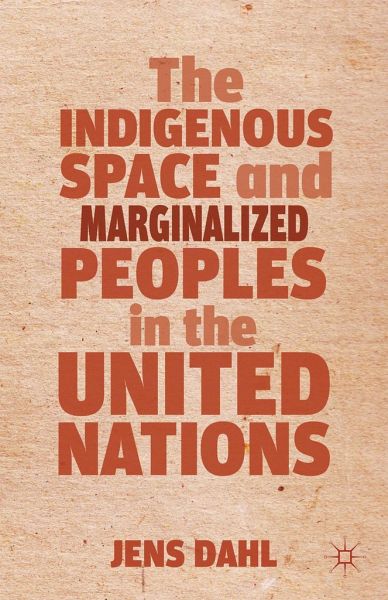
J. Dahl
Gebundenes Buch
The Indigenous Space and Marginalized Peoples in the United Nations
Versandkostenfrei!
Versandfertig in 6-10 Tagen
Weitere Ausgaben:

PAYBACK Punkte
19 °P sammeln!





In the UN, indigenous peoples have achieved more rights than any other group of people. This book traces this to the ability of indigenous peoples to create consensus among themselves; the establishment of an indigenous caucus; and the construction of a global indigenousness.
Jens Dahl is an adjunct professor in the Department of Cross-Cultural and Regional Studies at the University of Copenhagen, Denmark.
Produktdetails
- Verlag: Palgrave Macmillan / Palgrave Macmillan US / Springer Palgrave Macmillan
- Artikelnr. des Verlages: 978-1-137-28053-4
- 2012
- Seitenzahl: 296
- Erscheinungstermin: 5. Dezember 2012
- Englisch
- Abmessung: 223mm x 141mm x 22mm
- Gewicht: 493g
- ISBN-13: 9781137280534
- ISBN-10: 1137280530
- Artikelnr.: 35895709
Herstellerkennzeichnung
Libri GmbH
Europaallee 1
36244 Bad Hersfeld
gpsr@libri.de
"This book sets the record straight and seeks to redress the situation by examining the UN's posture toward indigenous peoples rights and issues. This book is recommended to social scientific students and readers, but most of all for all who need information about what indigenous peoples have achieved by develops an 'alternative space' within and outside the UN structure." - Henry Minde, professor, department of History and Religious Studies, University of Tromsø, Norway
"Jens Dahl's nuanced history and analysis of the emergence of a global indigenous network impresses on a number of fronts: firstly, its temporal and spatial scope covering the emergence of transcultural mobilization from disparate world regions and political
"Jens Dahl's nuanced history and analysis of the emergence of a global indigenous network impresses on a number of fronts: firstly, its temporal and spatial scope covering the emergence of transcultural mobilization from disparate world regions and political
Mehr anzeigen
contexts; secondly, its perceptive ethnographic investigation of the local and international fora, agencies and agents (author included) that have enabled the institutionalization of an indigenous presence at the UN; and thirdly, his forceful theoretical rejoinder to those who attribute structural inefficacy to subaltern voices. Dahl balances attention between the international domain and well-selected case studies that highlight the diversity of indigenous organizations, from Maasai NGOs in Tanzania and Kenya and Aymara grassroots organizations in the Andes to Jumma resistance fighters in Bangaladesh and the Inuit Greenland Self-Rule Parliament. Dahl's own involvement as a former director of the International Work Group for IndigenousAffairs (IWGIA) lends him a perspective that few scholars can match. A tour de force, this book will be the one people turn to for decades to come to learn how to effect political change on a global scale." - Kelly Askew is and anthropologist and Director, of African Studies Center, The University of Michigan, and author of Performing the Nation: Swahili Music and Cultural Politics in Tanzania)
Schließen
Für dieses Produkt wurde noch keine Bewertung abgegeben. Wir würden uns sehr freuen, wenn du die erste Bewertung schreibst!
Eine Bewertung schreiben
Eine Bewertung schreiben
Andere Kunden interessierten sich für


